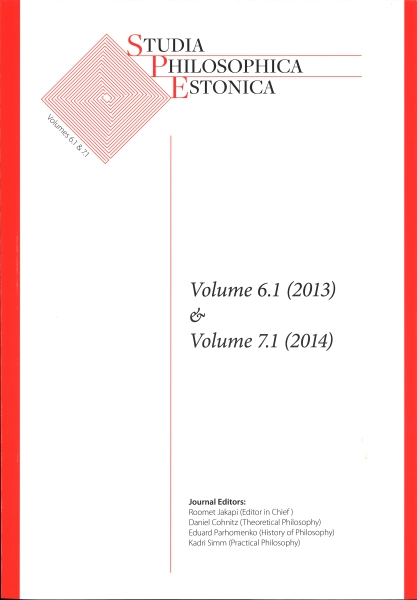Epistemic Disagreements: A Solution for Contextualists
DOI:
https://doi.org/10.12697/spe.2013.6.1.02Keywords:
epistemic contextualismAbstract
My paper aims to account for the possibility of disagreements concerning what we know; for clearly, people disagree about what they know. More precisely, my goal is to explain how a contextualist theory of knowledge attributions can explain the existence of disagreement among speakers. My working hypothesis is that genuine epistemic disagreement is possible only under the assumption that the meaning of the word “knowledge” is governed by contexts that are objective, in the sense that that the content of the word “knowledge” is fixed for all speakers sharing a common conversational goal. The paper is divided into two sections. In the first section, I explain why current versions of epistemic contextualism cannot account for epistemic disagreement. In the second section, following Christopher Gauker’s theory of linguistic communication, I offer my own contextualist solution to the problem of epistemic disagreement.
Downloads
References
Blaauw, M. (2005). Introduction: Epistemological contextualism, Grazer Philosophische Studien 69: i-xvi.
Cohen, S. (1986). Knowledgeand context, Journal of Philosophy 83: 574-583.
Cohen, S. (1999). Contextualism, skepticism, and the structure of reason, in J. Tomberlin (ed.), Epistemology, Vol. 13 of Philosophical Perspectives, Oxford University Press, Oxford, pp. 57-90.
DeRose, K. (1992). Contextualism and knowledge attributions, Philosophy and Phenomenological Research 52: 913-929.
DeRose, K. (2009). The Case for Contextualism: Knowledge, Skepticism, and Context, Vol. Oxford University Press, Oxford.
Gauker, C. (2003). Words without Meaning, MIT Press, Cambridge, MA.
Hendricks, V. (2006). Mainstream and Formal Epistemology, Cambridge University Press, Cambridge.
Kaplan, D. (1989). Demonstratives, in J. Almog, J. Perry and H. Wettstein (eds), Themes from Kaplan, Oxford University Press, Oxford, pp. 481-564.
Lewis, D. (1996). Elusive knowledge, Australasian Journal of Philosophy 74: 549-567.
Schaffer, J. (2005). What shifts? Thresholds, standards, or alternatives?, in P. Preyer (ed.), Contextualism in Philosophy. Knowledge, Meaning, and Truth, Oxford University Press, Oxford, pp. 115-130.
Stanley, J.(2005). Knowledge and Practical Interests, Oxford University Press, Oxford.

